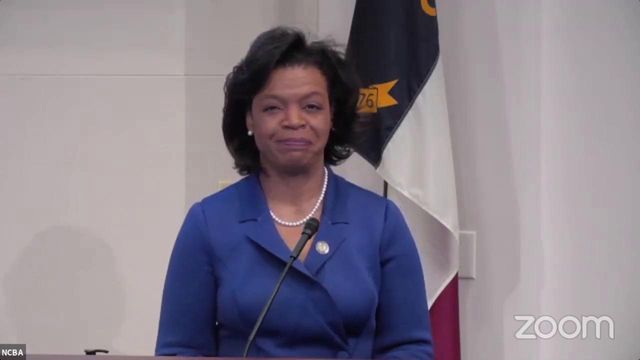NC Chief Justice: COVID-19, racial injustice bring opportunity for change
North Carolina Chief of Justice Cheri Beasley spoke Friday on the impact coronavirus and acts of racism have had on the courts system.
Posted — UpdatedNorth Carolina Chief Justice Cheri Beasley spoke Friday about the impact coronavirus and acts of racism have had on the state court system.
"These are unprecedented times," said Beasley, the first Black woman to serve as Chief. "The COVID-19 pandemic has presented challenges that our courts have never before faced, and calls for racial justice have gripped the nation's attention. But challenging times also present opportunities."
More than 12 judges, staff contract COVID-19
Although the court system has limited its in-person proceedings and added protective measures to its facilities, more than a dozen North Carolina judges and court employees have contracted COVID-19, Beasley said.
When someone tests positive for COVID-19, court sessions are canceled, facilities are sanitized and all staff are sent to be tested and quarantined.
Although business is conducted virtually when possible, courtrooms have remained open, Beasley said, and local courts across North Carolina have handled more than 20,000 cases a week since the pandemic began.
Thousands of those have been virtual.
On June 1, courts started hearing a greater number of cases in person, Beasley said. But with cases on the rise, strict safety guidelines are in place.
"I know that many of you are deeply concerned about the risk of coming to court," Beasley said. "Remote hearings remain the safest way to conduct court business, and I urge you to handle as many matters as possible remotely through WebEx."
Under Beasley's orders, courtrooms have been marked for social distancing, and plexiglass barriers and sanitizing stations have been installed. Gov. Roy Cooper has helped to secure critically needed personal protective equipment from the virus so that each person who comes to court without a face covering will be provided one.
"While we cannot completely eliminate the risk of exposure, we know that each of these safety measures reduces the risk of infection for everyone in the courthouse," Beasley said.
Jury trials delayed until August
Beasley said the pandemic has also caused a delay in jury trials, "a step that has not been taken lightly."
"Jury trials are a bedrock principle of our system of government, but they're also presenting unique safety challenges," she said. "Additional space is needed to socially distance jurors, and potential jurors tend to be older and at higher risk of serious complications if they contract COVID-19."
Beasley said she hopes jury trials will resume in August, but they will only if it can be done safely.
Combating racial injustice
Beasley spoke in length about the protests and demonstrations in North Carolina and across the country, advocating the importance of "trust and confidence that courts are a place where every case is decided based on principles of law and justice free from bias."
"Too many people believe that the system works against them," Beasley said. "Too many people believe that justice is rendered with bias. Too many people feel left behind in a system that is unwilling to change. Their beliefs are grounded in their experiences. They have seen and felt the difference in their own lives."
Beasley promised "painstaking work" will be done to examine current operations and said she is committed to working with elected officials across the state to improve North Carolina's justice system.
"We must have honest, constructive conversations about whether those results are truly just, and if not, we must set about even the more difficult work of change," she said.
Courts are looking to the Commission of the Administration of Law and Justice for recommendations on how to improve public trust and confidence in the justice system. One initiative includes the creation of school justice partnerships, which are now in place in 26 North Carolina counties.
"By coming together in this way, we will keep thousands of children in the classroom instead of sending them to a courtroom," Beasley said.
According to Beasley, it was also recommended that the judicial branch began pilot programs to improve the pre-trial release system through evidence-based practices.
Far too often, people who are too poor to pay even a relatively low bond spend more time in jail awaiting trial than they could ever receive, Beasley said.
"If found guilty of the offense, let me be clear -- these reform efforts do not simply release dangerous people into our communities," Beasley said. "Instead, we're exploring policies that ensure if someone is held, it is because they are dangerous, not because they're too poor to pay bail. If a person isn't likely to endanger their community, poverty shouldn't be what keeps them in jail."
Additionally, the launch of a new Faith and Justice alliance this year will allow the justice system to bring legal training and pro bono services to communities in need thanks to the combined work of faith leaders, attorneys and service providers.
"While this is truly an unprecedented and stressful time for our entire judicial branch and for the bar, it is also an immensely hopeful time," Beasley said.
• Credits
Copyright 2024 by Capitol Broadcasting Company. All rights reserved. This material may not be published, broadcast, rewritten or redistributed.






